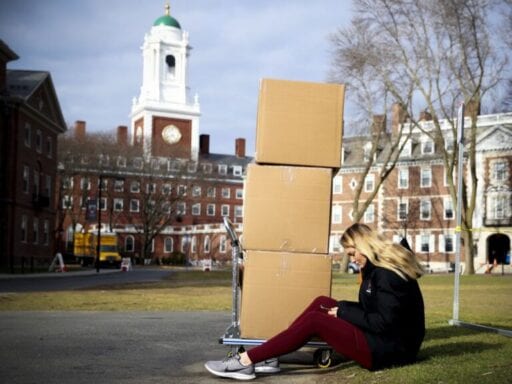Students have turned to crowdfunding to cover unexpected costs.
At the richest university in the world, students are turning to crowdfunding in order to cover sudden costs spurred by the college’s coronavirus response.
Harvard, like a number of schools, has requested that its students move to online classes and leave campus in order to reduce the spread of the outbreak. Yet, while the college will provide students in need of aid with some financial assistance — including for storage, transportation, and emergency housing — it won’t be addressing several other major costs that have emerged.
For instance, despite its $40 billion endowment, the university will not be offering aid for internet access that some students have said they will need in order to attend class remotely, and it has not announced plans to provide compensation for missed wages that a segment of students rely on to support themselves and their families.
It is, of course, far from the only school grappling with how to address the challenges posed by the coronavirus — but Harvard’s initial messaging rollout and expansive set of resources, in particular, have raised questions. As one student explained on Twitter, the college’s early communications didn’t offer many details about what financial support would look like for the transition.
A Harvard spokesperson pointed Vox to the Frequently Asked Questions page on the school’s website for more details about the response. On it, the college indicates that students can work with school officials to figure out plans for housing and other needs on a case-by-case basis.
As The Harvard Crimson’s Juliet Isselbacher and Amanda Su wrote last week, the financial weight of the sudden move-out has overwhelmingly affected first generation and low-income students — many of whom have had to juggle the abrupt change with a slew of unexpected expenses.
Harvard students are among many dealing with these issues: Such concerns are affecting students across the country as colleges work to limit the reach of coronavirus, and dramatically alter their approach to coursework.
College closures across the country are disproportionately affecting low-income students
According to CNBC, over 200 colleges and universities have closed or moved to remote classes since the beginning of the coronavirus public health crisis. Georgetown University education technology specialist Bryan Alexander has been tracking these closures, and they’re documented in a comprehensive spreadsheet.
This need to shutter campus operations has served as a reminder that for many students, college provides a support system that goes far beyond the classroom. As Isselbacher and Su reported, the move-out process has put tremendous pressure on first generation, low-income students. Others likely to bear the brunt of these policies include international students and foster youth, who aren’t able to return home on such short notice.
“For a lot of students, college is the only place where they have access to food on a consistent basis,” Anthony Abraham Jack, an assistant professor of education at Harvard, tells Inside Higher Ed. “Oftentimes, especially at residential colleges, it’s the only place that they have shelter without the worry of disruptions in utilities, disruptions in terms of feeling unsafe.”
Because of the sudden need to close down campuses, colleges have been forced to deal with how they can responsibly take preventive measures to curb the spread of coronavirus, while ensuring that students are equipped with the resources they need to respond to this change.
The approaches have varied at different institutions: Many colleges, including Harvard, Iowa State, and Smith College are asking students to leave campus, though students can petition to stay. The University of Maine and Michigan State University are among those that will keep some campus facilities including dorms and dining halls operational.
Across the board, however, the coverage of additional costs facing students due to shutdowns has been uneven.
Concerns about remote internet access, especially, are being felt at a number of institutions. Queens College Professor Kate Antonova told Wired she asked her students about high-speed internet access and found that many didn’t have it readily available.
According to a 2018 study from Indiana University, about 20 percent of college students have dealt with technical difficulties when it comes to schoolwork. Companies including Charter are offering free broadband packages to students who have been affected by these closures.
Other groups are trying to fill gaps left by colleges and universities
Groups run by alumni and students have rushed to fill the gaps colleges and universities have been unable, or unwilling, to account for.
At Harvard, for example, First Generation Harvard Alumni and the Franklin Delano Roosevelt Foundation are raising money and allocating it to cover a range of needs including internet service, lost term-time income and food assistance. At Tufts University, alumni have also formed a Mutual Aid group, which is helping to raise funds for students who need additional support for plane tickets, storage, and food. And many students at different colleges have posted the specific costs they’re facing on social media, with information about their Venmo accounts.
The sudden shift to remote classes is a move that has undue impact on the most vulnerable students, experts tell Inside Higher Ed.
Many institutions, it seems, are still reckoning with these effects.
Author: Li Zhou
Read More



